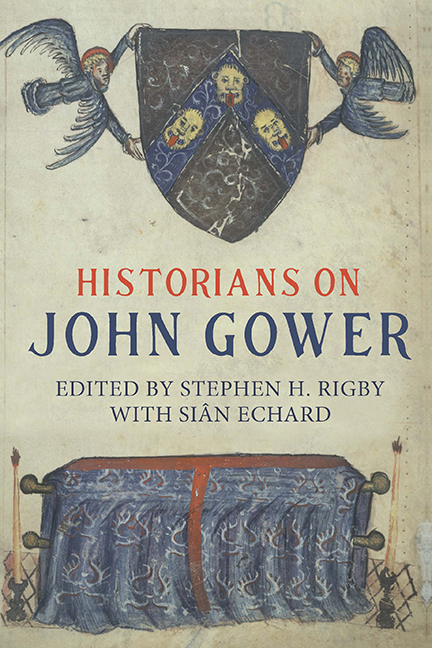Book contents
- Frontmatter
- Dedication
- Contents
- List of Illustrations
- Notes on Editors and Contributors
- Acknowledgements
- List of Abbreviations
- A Note on the References
- Preface: Gower in Context
- PART I Gower’s Life and Works
- PART II GOWER AND LAY SOCIETY
- PART III GOWER AND THE CHURCH
- PART IV GOWER AND GENDER
- PART V GOWER AND POLITICS
- PART VI GOWER AND COSMOGRAPHY
- Select Bibliography
- Index
- VOLUMES ALREADY PUBLISHED
13 - Gower, Richard II and Henry IV
Published online by Cambridge University Press: 26 May 2022
- Frontmatter
- Dedication
- Contents
- List of Illustrations
- Notes on Editors and Contributors
- Acknowledgements
- List of Abbreviations
- A Note on the References
- Preface: Gower in Context
- PART I Gower’s Life and Works
- PART II GOWER AND LAY SOCIETY
- PART III GOWER AND THE CHURCH
- PART IV GOWER AND GENDER
- PART V GOWER AND POLITICS
- PART VI GOWER AND COSMOGRAPHY
- Select Bibliography
- Index
- VOLUMES ALREADY PUBLISHED
Summary
John Gower spent much of his life writing for and about Richard II and his nemesis Henry of Lancaster. This chapter reassesses Gower's views on Richard's reign by examining the poet's writings in the context of his background in Kent, his social circle and political connections, the politics of Richard's reign, and contemporary perceptions of his rule. Key issues here are Gower's role as mentor to royalty in his letter to Richard in the Vox Clamantis; the dating of the critical comments about the king which Gower added to this text; Gower's stance in relation to the cause of the Appellants in 1387–88; the dating and significance of the changes which Gower made to the Confessio Amantis, particularly the change of dedication from Richard to Henry; the date of the composition of the three parts of the Cronica Tripertita, in which Gower wrote an account of Richard's misrule, his tyranny and overthrow; and the misleading nature of modern representations of Gower as a ‘Lancastrian propagandist’.
Gower's Circle
A kinsman of Sir Robert Gower, John Gower evidently had the benefits of a good education and may have studied law. From the 1360s, he used his connections, legal knowledge and business acumen to acquire landed estate in Kent and East Anglia. He bought a moiety of the manor of Aldington near Maidstone from William Septvans at Christmas 1365 and, after William's grant was annulled in 1366 on account of his minority, he secured a re-grant of the manor when William came of age in 1368. His property dealings in the 1360s and the 1370s reveal his association with leading Kent knights and squires, including Sir John Cobham, Lord Cobham, who was appointed by the crown in 1366 to enquire into Septvans business, and Sir Nicholas Loveyne of Penshurst, with whom Gower was associated in managing or mismanaging the young man's affairs. In 1373, with his title firmly established, Gower granted his manor of Aldington to Lord Cobham and others to hold in trust for his use. He rebuilt the manor-house there shortly after the Peasants’ Revolt in 1381 and probably retained it as his principal seat through the 1380s. Among his friends and neighbours were Thomas Brockhill, a trustee and eventually purchaser of Aldington, James Peckham of Wrotham, principal witness to the quitclaim of Aldington to Gower, and Arnold Savage of Bobbing, who later served as his chief executor.
- Type
- Chapter
- Information
- Historians on John Gower , pp. 425 - 488Publisher: Boydell & BrewerPrint publication year: 2019



